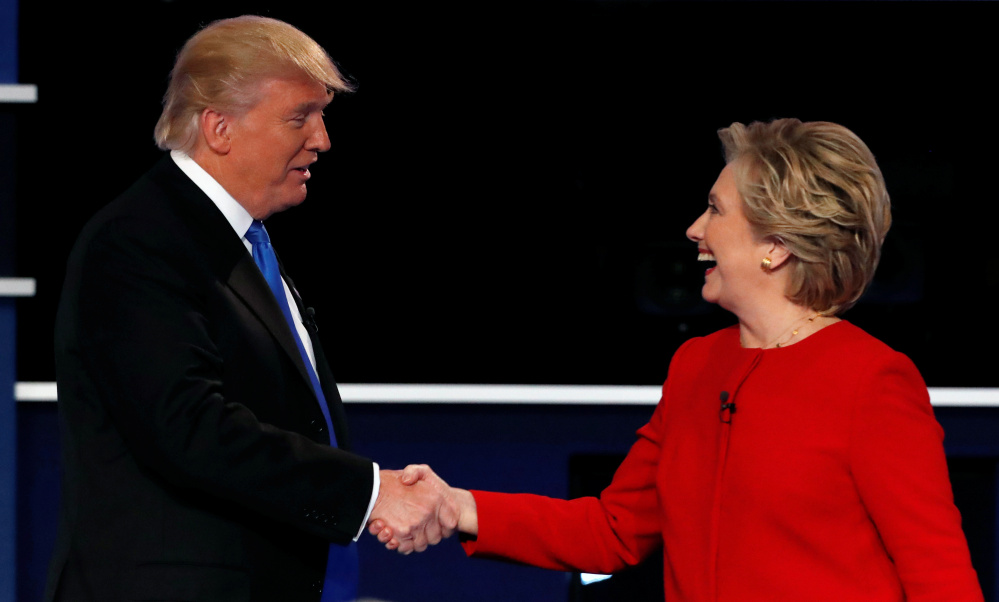Republicans learned again during the first presidential debate that no matter the setting, no matter the stakes, no matter the expectations, Donald Trump will insist on being Donald Trump. He will rise or fall politically as himself – brash, unpredictable, volatile and true to his own instincts.
Monday’s debate might not move mountains politically. Most Americans are already set in stone about their choice on Nov. 8. But Hillary Clinton didn’t need an earthshaking event on Monday. She needed no more than to resettle nervous Democrats and reinforce the reasons many college-educated white voters have had such reservations about voting for Trump. That much she no doubt accomplished, thanks in large part to Trump himself.
For weeks, Trump had been tethered to a teleprompter, delivering carefully scripted speeches on various policies. On Monday night, he was back to the Trump of the Republican primaries, a rough-hewn candidate with one overriding message, that being strength of leadership. But in that freewheeling environment also underscored a glaring and well-known weakness, which is his inability to resist responding to any slight or criticism.
Trump had never been in a debate like this before – 90-plus minutes against a single opponent and a free-flowing agenda of topics guided with minimal interference by moderator Lester Holt, the anchor of NBC’s “Nightly News.” For Trump, the format was not ideal: Presidential debates aren’t exactly endurance tests, but they require patience, preparation and some sense of pacing. Trump was like a sprinter in a marathon, starting with gusto and flagging the longer the night went on.
No one expected a full 90 minutes of deep policy discussion. There were too many other things that have defined the competition between Trump and Clinton that deserved an airing. But what became evident as the debate moved along is that Trump has a genuine substantive interest in few policies and once he’s said his piece, he is ready to move on.
His economic worldview is shaped by his long-standing views about the damaging effects of trade agreements. Those views have been fixed for years. His obsession with Mexico, China and the North American Free Trade Agreement is seemingly genuine and deeply felt. But he expended his talking points on trade in the opening minutes of the night. When pressed by Holt about how he would actually bring jobs back to the United States, his best response was to say he would prevent more from leaving.
Immigration, his signature issue, never came up. That was a potential missed opportunity for him, an opportunity lost to appeal to the many of the voters who provided the lift that handed him the Republican nomination. But it was also a potentially lost opportunity for Clinton, who needs to make additional appeals to Hispanic voters to ensure that they turn out as enthusiastically for her as they did for President Obama.
The section of the debate devoted to racial issues revealed a yawning gulf in the way they approach the issue and see the divisions that have been front and center throughout the campaign as a result of police shootings and police being shot. For Trump, the topic provided an opening to circle back to his acceptance speech at the Republican convention and to more recent rhetoric about what he sees as the conditions for black Americans. As Clinton talked about bringing communities together, Trump highlighted his message that what the country needs first and foremost is a dose of law and order.
What also became evident – again – is that Trump cares more than almost anything about his reputation as a businessman, a character trait that Clinton used effectively as a foil to bait him repeatedly. In defending himself and his business record, Trump offered insights into a cutthroat approach to business dealing and the pride he takes in using all means available to maximize his advantages.
Trump took offense at suggestions that he is not a self-made billionaire, despite the fact that he was given a hefty boost by his successful father. He suggested that profiting off the 2008 housing collapse was good business. He claimed that paying no income taxes was smart, although he again refused to pledge to release his tax returns before the election. He said that, if people are offended by his multiple use of bankruptcy laws to minimize his losses, they should change the laws rather than criticize him. He also suggested that stiffing vendors is fair game in some cases.
If Trump had a strategy coming into the debate, it was not evident. He interrupted constantly with protests or sarcastic asides, only in this case, Clinton was more skillful than the likes of Jeb Bush or Florida Sen. Marco Rubio or Texas Sen. Ted Cruz at ignoring those interruptions and continuing to poke at his soft spots.
Instant polls showed Clinton the winner of Monday’s debate, but instant debate polls are not a measure of voting intentions six weeks from now. What Trump cannot afford is another performance like the one he delivered on Monday.
Send questions/comments to the editors.



Success. Please wait for the page to reload. If the page does not reload within 5 seconds, please refresh the page.
Enter your email and password to access comments.
Hi, to comment on stories you must . This profile is in addition to your subscription and website login.
Already have a commenting profile? .
Invalid username/password.
Please check your email to confirm and complete your registration.
Only subscribers are eligible to post comments. Please subscribe or login first for digital access. Here’s why.
Use the form below to reset your password. When you've submitted your account email, we will send an email with a reset code.